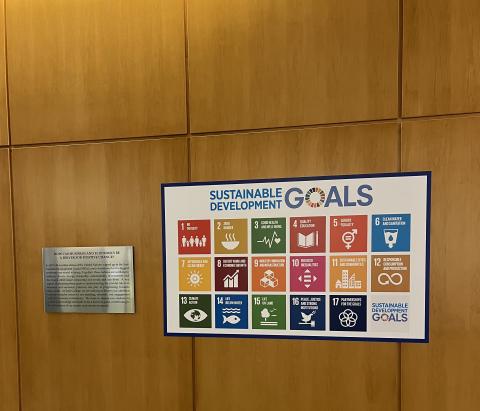Infusing Sustainability into Business Education

Paul College SDG Wall
Walk through PAUL College on the ground floor and you’ll spot the 17 SDGs poster on the wall. The United Nations Sustainable Development Goals, as they are officially known, are the guiding objectives of the United Nations Member States. More importantly, they’ve become a catalyst behind businesses’ and society’s growing efforts to reimagine current structures. From renewable energy sources to fully circular food systems, innovators are continually finding better ways to transform practices into efficient and sustainable methods.
Here at UNH, PAUL College recently decided to incorporate the SDGs into its first-year student FIRE (First-year Innovation and Research Experience) program. Although PAUL had been including an emphasis on the goals for several years already, the new addition to the FIRE program meant that students would begintheir UNH experience familiarizing themselves with the concepts and learning to think from a sustainable perspective first. “We thought it would be a good framework moving into this year,” said Saege Robinson, Educational Program Coordinator. “The motivation was really driven behind the idea of discovering what was relevant to business, and the concept of purpose kept surfacing. This factor is something that we’ve seen the next generation often thinking about.”
‘Purpose Driven Business’ became the topic for this year’s Hamel Undergraduate Research Conference (URC), where student teams present their business ideas. As part of the program’s framework, the teams must research and develop a solution to a real-world issue, which they then create a business plan toward. Among the guidelines involved, students must determine a concept that is currently technologically possible but has not yet been created. The new program implements the task of addressing an SDG within the project. Faculty selected eight SDGs relevant to the topic and students were able to narrow the choice to five by voting on their top choices. Hunger, poverty, infrastructure, education, and climate action were picked as the overall goals to work with.
Study findings are presented at the URC at the end of the year, following the annual Grand Challenge competition. “Our hope is that the Grand Challenge and the FIRE program can help students to find the things they care about,” Saege remarked. “The goal is for them to realize that they can take action towards and have agency over different issues. A lot of times, first-year students don’t necessarily see all the benefits until afterward, but they come to understand and speak highly of it in the long run. It’s great to see the passion that many of them discover.”
